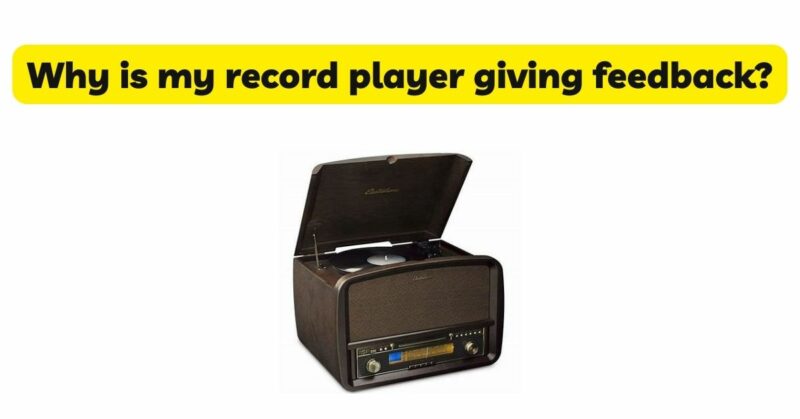Record players have made a remarkable comeback in recent years, capturing the hearts of audiophiles and music enthusiasts alike. There’s something truly captivating about the warm, analog sound that vinyl records produce. However, like any technology, record players can encounter issues that can detract from the listening experience. One such problem is feedback, an annoying and disruptive sound that can emerge during playback. In this article, we will explore the reasons why your record player may be giving feedback and provide practical solutions to help you troubleshoot and resolve this issue.
- Understanding Feedback: Feedback, in the context of record players, refers to a high-pitched squeal or a low-frequency hum that occurs when the sound from the speakers is re-amplified by the system. It is caused by an audio loop between the speakers and the record player’s cartridge, resulting in a constant, unpleasant noise. Feedback can significantly impact the quality of your listening experience, rendering the music distorted and frustrating.
- Poor Grounding: One of the most common causes of feedback is poor grounding. In record players, grounding refers to the proper electrical connection between the turntable and the receiver or amplifier. A lack of proper grounding can lead to an electrical imbalance, resulting in the feedback loop. To resolve this issue, check if all the necessary grounding wires are connected securely. Additionally, ensure that the turntable and the amplifier share a common ground.
- Placement and Isolation: The placement of your record player can also contribute to feedback issues. Vibrations from external sources, such as speakers or subwoofers, can transfer to the turntable, causing the needle to vibrate and create feedback. To mitigate this problem, consider isolating your record player from external vibrations. Place it on a stable surface away from speakers or other electronic devices that generate vibrations. You can also invest in isolation platforms or stands that minimize vibrations and resonance.
- Tonearm Alignment and Tracking Force: Incorrect tonearm alignment and tracking force can lead to feedback problems. The tonearm is responsible for tracking the record’s grooves accurately, and any misalignment can cause the needle to skip or create excessive vibrations. Consult your record player’s manual for instructions on aligning the tonearm correctly and setting the appropriate tracking force. A properly aligned and balanced tonearm will help reduce feedback and improve playback quality.
- Cartridge and Stylus Issues: Feedback can also be caused by problems with the cartridge or stylus. A worn-out or damaged stylus can produce irregular vibrations, resulting in feedback. Similarly, an incorrectly installed or misaligned cartridge can introduce unwanted resonances. Regularly inspect your stylus for signs of wear and replace it if necessary. When installing or aligning the cartridge, follow the manufacturer’s instructions carefully to ensure proper performance and minimize feedback.
- Interference and Electrical Noise: External interference and electrical noise can affect the performance of your record player and contribute to feedback issues. Electromagnetic interference from nearby electronic devices, such as smartphones, Wi-Fi routers, or fluorescent lights, can disrupt the delicate signal processing of your turntable. Keep your record player away from sources of electromagnetic interference and ensure that cables are properly shielded to minimize noise pickup.
- Cable Quality and Connections: The quality of your audio cables and their connections play a crucial role in the overall sound reproduction and feedback prevention. Poorly shielded or damaged cables can pick up external interference, leading to feedback issues. Ensure that all connections are secure and that cables are in good condition. Consider investing in higher-quality cables with better shielding to minimize the risk of feedback.
- Environmental Factors: Environmental factors, such as humidity and temperature, can also impact the performance of your record player and contribute to feedback. High humidity levels can affect the electrical components, causing malfunctions and introducing noise. Extreme temperatures can also impact the performance of the cartridge and stylus. Keep your record player in a controlled environment with moderate humidity levels to ensure optimal performance.
Conclusion: Feedback can be frustrating when enjoying your vinyl collection on a record player, but with the right troubleshooting steps, it can be resolved. By understanding the causes of feedback, such as poor grounding, placement issues, tonearm alignment, cartridge problems, interference, cable quality, and environmental factors, you can effectively address the issue and restore the pristine sound quality of your record player. Follow the tips provided in this article, and with a little patience and effort, you’ll be able to eliminate feedback and enjoy your vinyl collection to its fullest potential.


